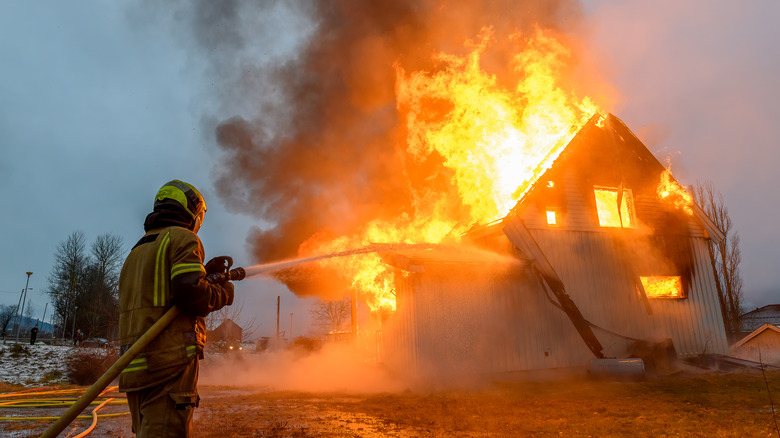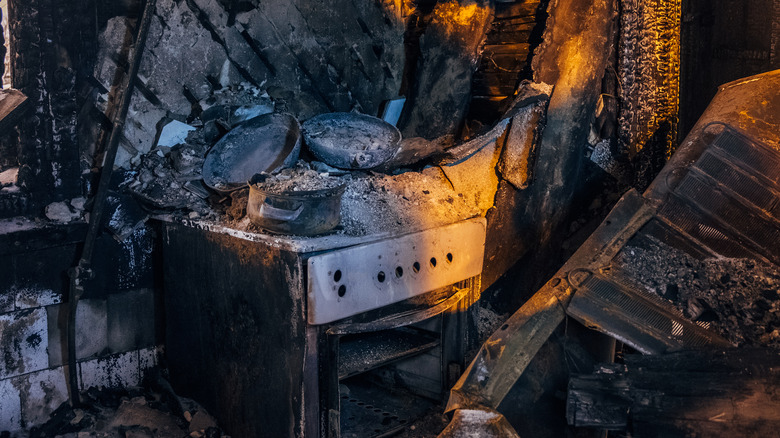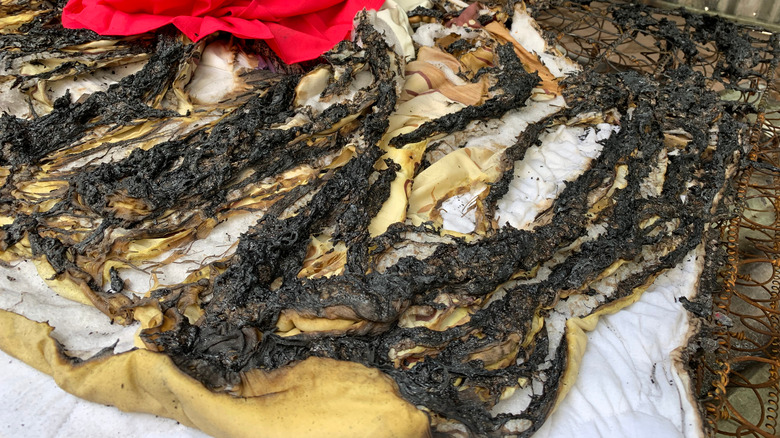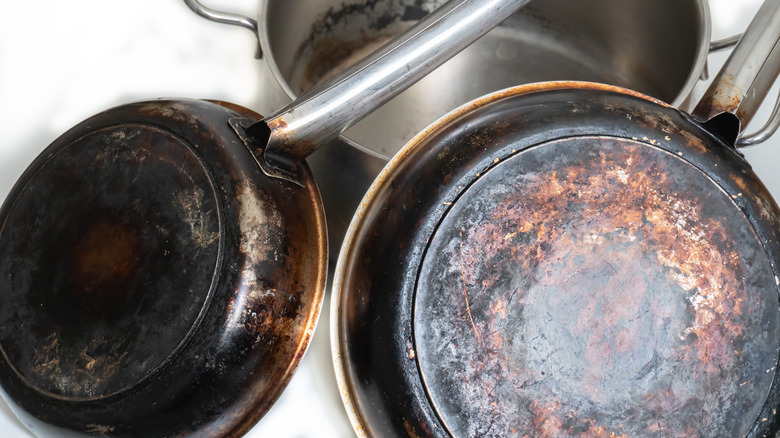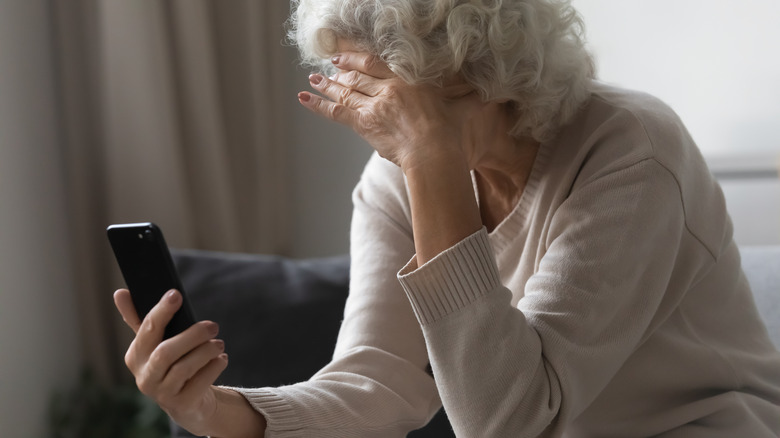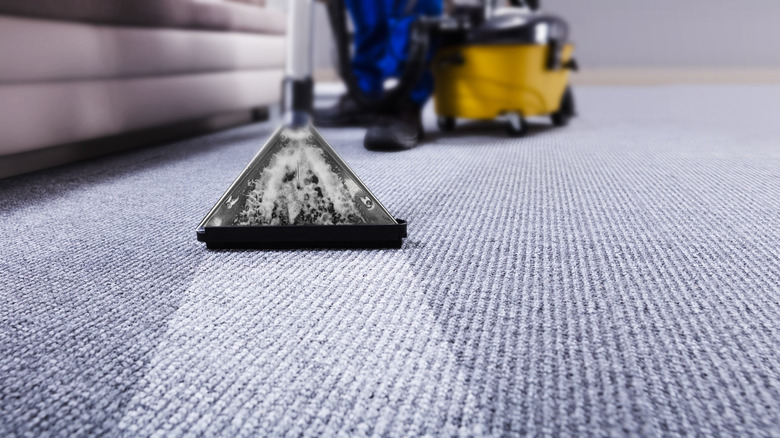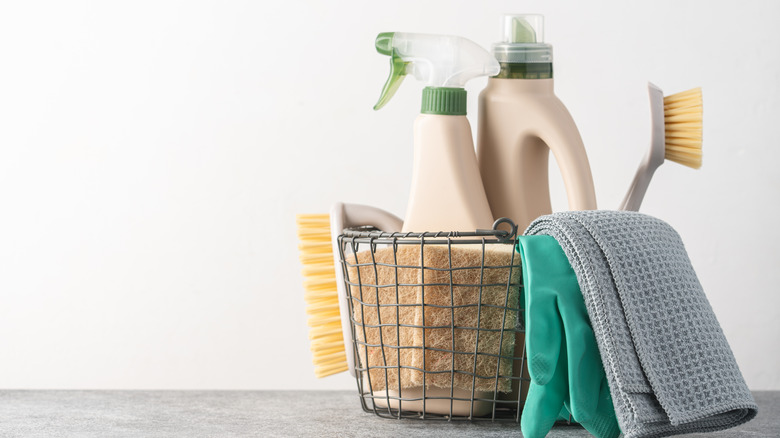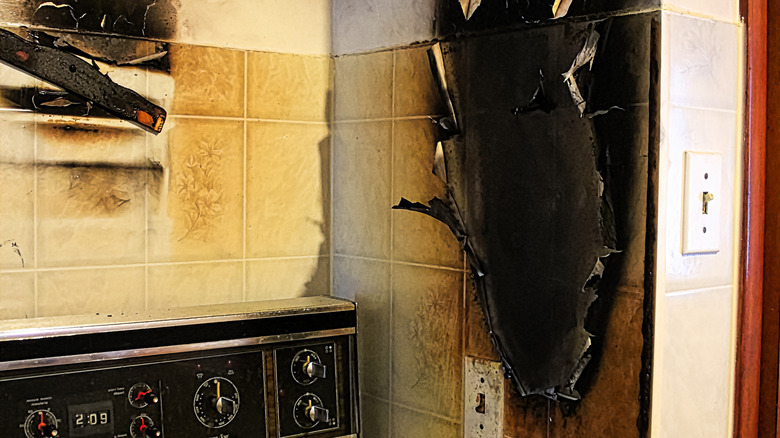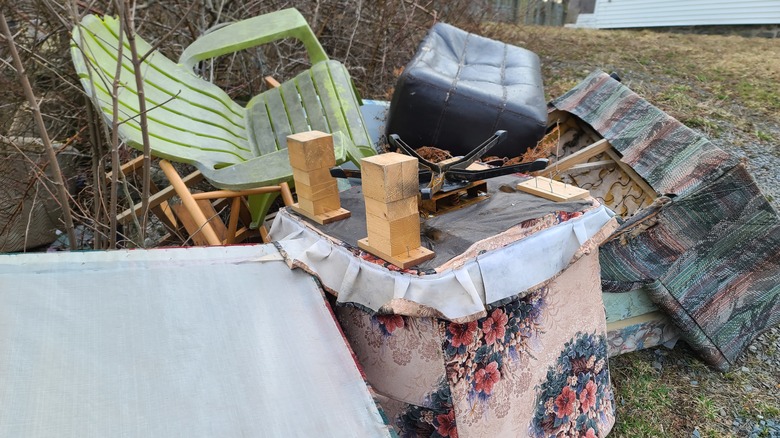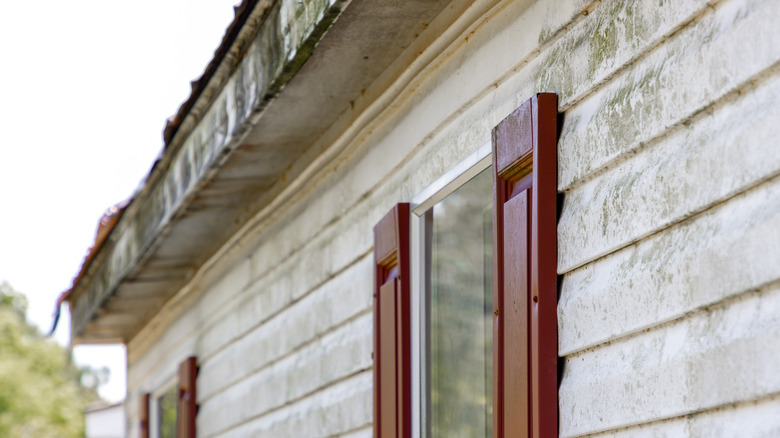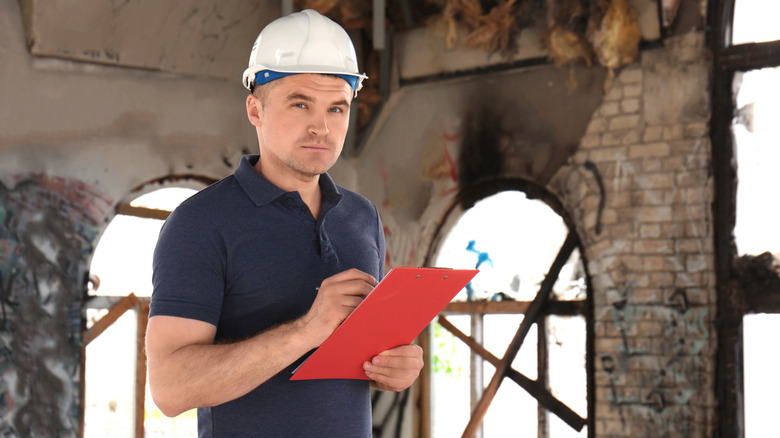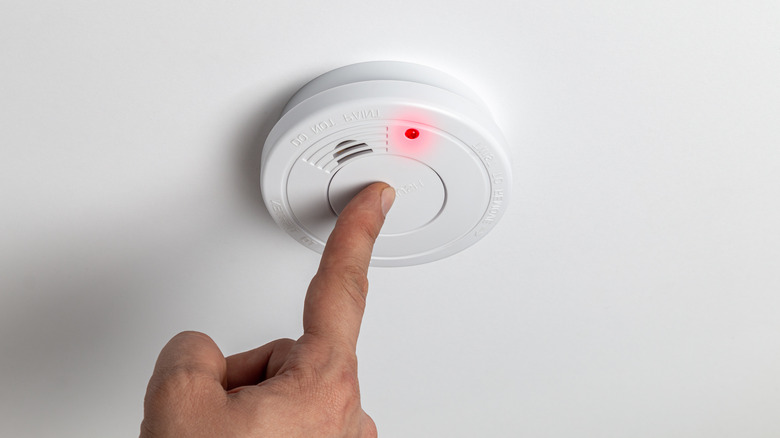The Best Way To Clean Up After A House Fire
Most people can only imagine the horrifying experience of going through a housefire. For those who've been through it, the aftermath is just as frightening. Homes, if not wholly destroyed, are left with disastrous messes to clean up, and homeowners are left trying to salvage as much as possible. American Psychological Association points out that not only do homeowners lose priceless things like photos and other irreplaceable treasures in a fire, but they also experience a loss of security when the place they call home is severely damaged or possibly gone.
If you've been through or are going through the stressful aftermath of a fire, it's hard to imagine that you now have to clean up what's left. Thankfully, using some helpful methods, it's possible to get through what seems like an impossible task. Take your time and salvage what you can so you can begin to rebuild your home and go on with your life.
Assess the home and what's left
It won't be easy, but it's necessary to walk through what's left once you're given the all-clear to do so. Before cleaning up, you'll need to see what's worth saving. According to Restoration Local, soot and smoke travel further than the flames of a fire. That means even if the fire didn't reach a certain area, the smoke and soot may have. It works its way into anything and everything, so even areas that look untouched need to be thoroughly checked over.
Going through your home after a fire to see what you can clean up and save is an emotional time. Be patient with yourself and those helping you. It won't be a process you want to rush. Expect the need to take breaks, so no one gets too drained emotionally or physically. Also, do what you can to protect items that are still in the home but not yet removed. Attaching tarps and large sheets of plastic is helpful in protecting what's still left behind.
Items to toss after a fire
Some things may look okay after a fire but could, in fact, no longer be safe to use. It's important to understand what's safe to keep and what isn't. Certain items, if slightly damaged, can be cleaned up and possibly go right back to fulfilling their position in your home.
However, according to Restoration Local, the following items should be thrown away after a fire: medicines, plastic that's melted or stained, boxed foods or canned foods that were exposed to fire, food that was left in a refrigerator after it lost power, toiletries that were exposed to not only flames but smoke and soot, bedding, clothing and towels that got burnt, and any furniture or bed mattresses that are damaged at all by fire. Even if it's only a small area that was burned, the furniture won't be as stable as it was before the fire. It's frustrating to have to throw out items that look like they might be okay, but you're better safe than sorry. Just remember, things can be replaced.
Items that are often salvageable
Understanding what is often salvageable after a house fire will give you a good idea of what's worth keeping and what's worth cleaning up. Some items might look a little worse for the wear but are still okay to use. According to Restoration Local, if anything is salvageable, it's usually your non-porous items, such as metal and glass, or even your hardwood floors. The non-porous surfaces make clean-up a bit more probable. Still, if an item is charred or burnt at all, toss it.
Your kitchen area is a good place to start when looking for a glimmer of hope. Of course, if the fire started in the kitchen, there's less of a chance there will be much to save, depending on the severity of the fire. Dishes, cooking utensils, mixing bowls, and all of those items that can withstand the heat better than other things in the home may just need a good soaking in vinegar or baking soda, along with a gentle scrub with dish soap.
Contact the insurance company
The insurance you've been paying on for years is now here for you after a house fire. Contact them immediately so they can let you know quickly how they can help.
According to Allstate, most homeowners' insurance covers the home and needed repairs, personal belongings, and any unattached structures on the property after a house fire. It's important to understand what your policy covers so you aren't left with the worry of wondering what will be replaced financially and what can be fixed. During the stressful trial of dealing with all that has to be dealt with after the fire, however, can leave a person unsure of everything. Your insurance agent is there to answer all your questions. When you make the call, be prepared with as much information as possible, such as the date of the fire, the fire report, and photos, in case they ask for them.
Continue to pay your bills
It seems like common sense, but people aren't usually thinking about their bills after the scary experience of a house fire. Remember, even though you're in shock, the utility companies don't know what's going on in your life. House fires occur for any number of reasons, and the severity varies. You may have to take a long time off of work just to deal with everything. Hopefully, your job allows you the time with pay, but for many, it may not. The loss of income makes things difficult, especially when paying bills.
According to Consumer Financial Protection Bureau, you should contact your mortgage service immediately to let them know what's going on, as well as the utility companies. If your home is destroyed, there's no sense paying an electric bill. Your mortgage still must be paid even after a fire, but they may be willing to work with you in the case of a disaster that's affecting your income. Make a list of all your bills and spend a day making the necessary calls.
Consider professional help
Depending on the extent of the damage, professional help may be the only way to get what's left as clean as possible. Doing it yourself might also take its toll emotionally. Going through your home after things of sentimental value are destroyed isn't an easy task. You've been through enough, and there are professional services willing to step in.
Besides the emotional toll, those of us who don't understand all there is to know about fire, smoke, and soot damage could potentially miss areas or items that need extra cleaning attention. According to United Restoration, Inc, when you hire experts trained in fire restoration, your home receives a thorough inspection, paying close attention to areas that look fine now but may cause issues down the road. If you haven't been through it before, it's tough to imagine the permanent and future damage that a fire can cause. Professionals not only know what to look for, but they also get things done properly and quickly and can help answer questions your insurance company might have.
Collect the right cleaning tools and solutions
If you are going to clean up the house yourself or do at least some of it on your own, start by collecting everything you need. Cleaning up after a fire isn't like your typical house cleaning day. Thankfully, everything you need is easily found at most stores, and you can have your cleaning weapons put together in no time.
According to the American Red Cross, before beginning any after-fire cleaning, make sure the area has been wet down so you won't breathe in dust and soot as easily. Also, wear protective clothing and gloves to help keep yourself safe.
Keep the following on hand: bleach, trisodium phosphate (TSP), warm water, buckets, baking soda, dish soap, laundry detergent, and plenty of rags. A mixture of 4 to 6 tbsp of TSP along with one cup of bleach and a gallon of warm water is an excellent solution for cleaning, but you may want to try a mild detergent first, as TSP is toxic and much care has to go into using it (gloves, eyewear, and long sleeves and pants). Take your time and work slowly, so nothing is missed.
Cleaning the walls and windows
Walls and windows are prone to mold and mildew after a fire, so they need to be carefully cleaned. Don't try to quickly clean a large wall in one giant swoop. Instead, wash small areas at a time. You can clean your walls using dish soap and warm water or use one cup of bleach mixed with a gallon of warm water (adding the 4 to 6 tbsp of TSP if you desire). Remember to protect your eyes and skin when cleaning. According to the American Red Cross, it's best to start at the bottom when cleaning walls and work your way up to avoid streaking. They also recommend rinsing the walls with clear water after washing and then cleaning the ceiling last.
For the windows, Feldco recommends putting your garden hose to work. Simply spray off the windows, allow them to dry, and see how they look. You can also use your pressure washer if the soot is thick. Either way, follow up with glass cleaner to make your windows sparkle again.
Cleaning furniture and floors
Furniture is quite an expense and worth saving if possible, as are floors. If the damage isn't too extensive, both can be cleaned up and used again. However, even a small amount of damage can make a piece of furniture unstable or a floor unsafe, and if that's the case, it isn't worth risking injury just to keep either one. If smoke is the only issue, there is hope for salvaging your furniture and floors.
Take furniture outside, if possible, when cleaning it. Let the fresh air and sunshine help you out when trying to get rid of the smokey smell. According to All Dry USA, the first step is to vacuum furniture, then sprinkle with baking soda, let sit for 24 hours, and vacuum again. Remove any washable covers and wash those in the laundry. Repeat these steps as needed. For wood and leather furniture, use the same methods of vacuuming and using baking soda, but then also wipe down the furniture with the appropriate wood or leather cleaners.
To clean your floors, first deal with the water left from fighting the fire. A shop vac works well for that. Once they're dry, use the dry shop vac to remove all dust and soot, then wash your floors as normal until they are as clean as you need them to be. Keep in mind that you may find you can't get them as clean as you hoped, or they may have too many stains. In that case, consider replacing the floors.
Cleaning the exterior of your home
Once the inside is taken care of, it's time to work on the exterior of your home. Start at the roof and work your way down, remembering areas where soot can hide, such as the gutters. According to Dumpsters.com, gutters collect ash during a fire, and they'll get clogged if not cleaned out. Place ash in double-bagged garbage bags to prevent the dust from escaping.
For the rest of the exterior of your home, once damages are checked out and assessed, you can trust your power washer to get rid of a lot of soot on your exterior walls and windows. If you don't own one, you can rent a power washer. Power wash where necessary, allow to dry, then take a look to see if you'll need to go over it again or scrub some areas with detergent and water. After washing with water, windows can be cleaned with a regular glass cleaner. Pay close attention to scorched or melted roof shingles and house siding. Those areas need to be replaced.
Begin to rebuild your home
The insurance claim has been made, the home is clean, and whatever could be salvaged has been salvaged. Now it's time to begin to rebuild. Rebuilding has a different meaning for every homeowner who's been through a fire. Some homes have minimal damage, and restoration happens quickly, while others lose everything, and to rebuild means truly starting from scratch.
Damage from a fire consists of more than the fire and smoke. Much damage is done because of the way fires are put out as well. It's unavoidable, of course. Fires must be put out. Still, those layers of damage from fire, smoke, soot, water, and any other chemicals used to put out the fire lend to a lot of work toward restoration.
According to Restoration Master, the type of system used to distinguish the fire also makes a difference in the extent of damage, and new technology, such as the acoustic extinguishing method, effectively stops fires and uses no water or chemicals. No matter the damage, work with your insurance company and a contractor to discuss what's covered and whether or not your home needs a complete rebuild or just needs repairs.
Allow yourself to recover
The emotional toll is high after a housefire. If necessary, seek counseling to discuss your emotions and feelings. Take some time for self-care and make sure the rest of your family is handling the shock in a healthy manner. Your home is a place of security for yourself and for your family. A fire sort of rips that security out from under a person, and suddenly their world is shattered. There's nothing wrong with you if you're having a hard time moving on.
According to the American Psychological Association, it's common for people to feel several emotions after a fire, including shock, anger, depression, and hopelessness. It's best to acknowledge these feelings and understand they may happen, rather than feeling ashamed or frustrated that you aren't feeling like your "normal" self. Allow yourself to feel what you're feeling and focus on doing what you need to do to help bring the stress and worry down. Exercise, eat well, meditate, and talk with friends or a counselor. There is a lot to take care of after a fire, but now isn't the time to forget about your physical and mental health.
Protect your home from further damage
Once you get your life back in order, it's time to make sure your repaired or new home is protected from further or new damage. Nothing is guaranteed, but you'll have peace of mind knowing you're doing everything you can to prevent another fire.
First and foremost, as you rebuild, make sure there's a smoke detector in every area recommended for your home. According to the National Fire Protection Association, that means one in every bedroom, outside sleeping areas, and on every level, including the basement. Next, go through each room and look for fire hazards and areas where you can add more protection, such as covering mattresses with a flame-retardant cover or removing curtains that are near hot appliances like the stove.
Learn how to properly use your fire extinguisher and, more than anything, have a plan in case of a fire. According to Safewise, you should establish two ways to escape from every room, have two meeting places for your family, teach kids fire safety and how to call 911, make sure everyone knows how to shut off the gas and power and practice these things twice a year.
Have your pets checked out
After a fire, the residents are always checked to make sure there are no health issues. If you have fur babies, do the same for them with a vet visit to make sure their lungs are clear. According to Embrace Pet Insurance, it isn't burns that cause the most damage to your pet but the inhaling of carbon monoxide. The breathing in of carbon monoxide causes organ damage. Signs to look out for with your pet after a fire are red gums, rapid breathing, fainting, and vomiting. If you see these symptoms, it's an emergency, and you should get your pet to the vet right away.
Pets can also go into shock after a fire since their systems have been through a lot. Burns are, of course, a concern, as well as heat stroke and blocked airways. Even if you don't see any signs, schedule time for your pet to get a wellness check and let their doctor know they have been through a house fire so they know what to look for.
